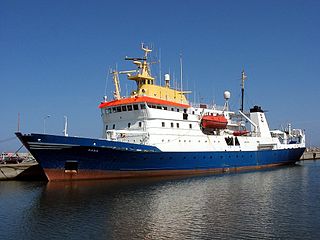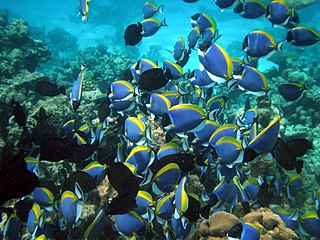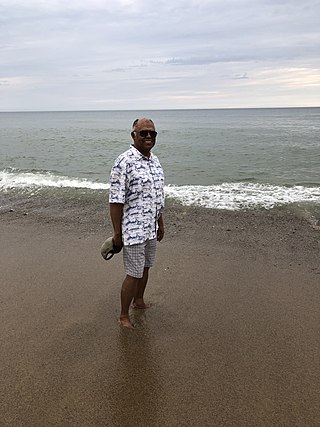
Fisheries science is the academic discipline of managing and understanding fisheries. It is a multidisciplinary science, which draws on the disciplines of limnology, oceanography, freshwater biology, marine biology, meteorology, conservation, ecology, population dynamics, economics, statistics, decision analysis, management, and many others in an attempt to provide an integrated picture of fisheries. In some cases new disciplines have emerged, as in the case of bioeconomics and fisheries law. Because fisheries science is such an all-encompassing field, fisheries scientists often use methods from a broad array of academic disciplines. Over the most recent several decades, there have been declines in fish stocks (populations) in many regions along with increasing concern about the impact of intensive fishing on marine and freshwater biodiversity.

The National Marine Fisheries Service (NMFS), informally known as NOAA Fisheries, is a United States federal agency within the U.S. Department of Commerce's National Oceanic and Atmospheric Administration (NOAA) that is responsible for the stewardship of U.S. national marine resources. It conserves and manages fisheries to promote sustainability and prevent lost economic potential associated with overfishing, declining species, and degraded habitats.

Jane Lubchenco is an American environmental scientist and marine ecologist who teaches and conducts research at Oregon State University. Her research interests include interactions between the environment and human well-being, biodiversity, climate change, and sustainable use of oceans and the planet. From 2009 to 2013, she served as Administrator of NOAA and Under Secretary of Commerce for Oceans and Atmosphere. In February 2021, she was appointed by President Joe Biden to serve as Deputy Director for Climate and Environment in the White House Office of Science and Technology Policy.
Anne Elizabeth Magurran is a British Professor of ecology at University of St Andrews in Scotland. She is the author of several books on measuring biological diversity, and the importance for quantifying biodiversity for conservation. She has won numerous awards and honors, is regularly consulted for global assessments and analyses of biodiversity and conservation and her research is often highlighted by journalists.

The Hatfield Marine Science Center(HMSC) is a marine science research and education center next to Yaquina Bay of the Pacific Ocean in the U.S. state of Oregon. It is operated by Oregon State University in cooperation with five state and federal agencies co-located on site. Named after Mark Hatfield, a former U.S. Senator from Oregon, the HMSC occupies a 49-acre (20 ha) site in Newport.
A fishery is an area with an associated fish or aquatic population which is harvested for its commercial value. Fisheries can be wild or farmed. Most of the world's wild fisheries are in the ocean. This article is an overview of ocean fisheries.

In biology, any group of fish that stay together for social reasons are shoaling, and if the group is swimming in the same direction in a coordinated manner, they are schooling. In common usage, the terms are sometimes used rather loosely. About one quarter of fish species shoal all their lives, and about one half shoal for part of their lives.
Tony J Pitcher is a fisheries scientist, well known for his work on the impacts of fishing, the management appraisal of fisheries, and how shoaling behaviour impacts fisheries.
John Reynolds is a Canadian ecologist and holder of the Tom Buell BC Leadership Chair in Salmon Conservation and Management at Simon Fraser University. He is a specialist in fish ecology and conservation, particularly Pacific salmon in the Great Bear Rainforest, as well on extinction risk in marine fishes. He is Co-Chair of marine fish committee of the COSEWIC.

Steven J. Cooke is a Canadian biologist specializing in ecology and conservation physiology of fish. He is best known for his integrative work on fish physiology, behaviour, ecology, and human-dimensions to understand and solve complex environmental problems. He currently is a Canada Research Professor in Environmental Science and Biology at Carleton University and the Editor-in-Chief of the scientific journal Conservation Physiology.

Dr. Robert J. Behnke was an American fisheries biologist and conservationist who was recognized as a world authority on the classification of salmonid fishes. He was popularly known as "Dr. Trout" or "The Trout Doctor". His seminal work, Trout and Salmon of North America, was published in 2002. He wrote a regular column for Trout Magazine, the quarterly publication of Trout Unlimited. He was a fisheries biologist with the U.S. Fish and Wildlife Service in the Colorado Cooperative Fish and Wildlife Research Unit and a professor at Colorado State University in the 1970s. He became a Professor Emeritus at the Department of Fishery and Wildlife Biology at Colorado State University.
Felicity Anne Huntingford FRSE is an aquatic ecologist known for her work in fish behaviour.
Robert (Bob) Montgomery McDowall was one of New Zealand's most prominent freshwater ichthyologists.
The Fisheries Society of the British Isles is an international, non-political, learned society, based in the United Kingdom, that supports scientific activity in fish biology and management through charitable sponsorship. Membership is open to anyone interested in these objectives. There have been eleven Presidents of the FSBI since its foundation including Ray Beverton FRS and Felicity Huntingford FRSE.
Alwyne (Wyn) Wheeler was a British ichthyologist who was a curator at the Natural History Museum in London. He was educated at St Egbert's College, Chingford, and Chingford County High School to Higher School Certificate level, and was unusual in that his subsequent scientific career was achieved despite his never having obtained a university degree.

The loggerhead sea turtle, is protected under the Endangered Species Act (ESA) of 1973. It was originally listed as a threatened species on July 28, 1978. The turtle's status was updated to Vulnerable (VU) on August 23, 2018. The loggerhead turtle is the most prolific species of sea turtle in U.S. coastal waters.

The Beverton Medal is a prestigious. international fish biology and/or fisheries science prize awarded annually. It is awarded to a distinguished scientist for a lifelong contribution to all aspects of the study of fish biology and/or fisheries science, with a focus on ground-breaking research. The medal was established as the highest award of the Fisheries Society of the British Isles (FSBI) to recognize distinction in the field of fish biology and fisheries science, to raise the profile of the discipline and of the Society in the wider scientific community. Medals are awarded to individuals who have made an outstanding contribution to fish biology and/or fisheries. The Beverton Medal is traditionally awarded in July at the Fisheries Society of the British Isles annual international conference.
Victoria A. Braithwaite was a British scientist who was a Professor of Animal Behaviour and Cognition at Pennsylvania State University. She was the first person to demonstrate that fish feel pain, which impacted animal welfare research and changed guidelines for the treatment of fish in laboratories and fisheries in the UK, Europe, and Canada.

Ambrose Jearld Jr. started his career as one of the first black fisheries biologists at the National Oceanic and Atmospheric Administration and spent his nearly 40-year career as a marine biologist at the Northeast Fisheries Science Center (NEFSC) in Woods Hole, Massachusetts. The lecture series named after him in Woods Hole reflects his career-long commitment to increasing diversity in environmental and fisheries sciences.










